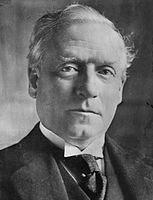
Asquith coalition ministry

Asquith coalition ministry | |
|---|---|
| 1915–1916 | |
 | |
| Date formed | 25 May 1915 |
| Date dissolved | 5 December 1916 |
| People and organisations | |
| Monarch | George V |
| Prime Minister | H. H. Asquith (pictured) |
| Prime Minister's history | 1908–1916 |
| Total no. of members | 85 appointments |
| Member parties | |
| Status in legislature | Majority (coalition) |
| Opposition party | Opposition Conservative Party (1915–1916) |
| Opposition leader | Sir Edward Carson (1915–1916) |
| History | |
| Legislature terms | 30th UK Parliament |
| Predecessor | Third Asquith ministry |
| Successor | Lloyd George war ministry |
The Asquith coalition ministry was the Government of the United Kingdom under the Liberal prime minister H. H. Asquith from May 1915 to December 1916. It was formed as a multi-party war-time coalition nine months after the beginning of the First World War[a] but collapsed when the Conservative Party withdrew.

History
This section includes a list of general references, but it lacks sufficient corresponding inline citations. (October 2020) |
The new Cabinet included nine Conservatives and one Labour minister, but the Liberals continued to hold most of the important posts;[R. 2003] the Conservatives had demanded Cabinet seats, but they only received lesser positions. Not at all satisfied, Conservative Party leader Bonar Law continued the verbal attacks.

The ministry collapsed on 5 December 1916 as a result of Conservative resignations, who refused to serve under Asquith's leadership. Asquith and most of the Liberals then moved into opposition, while the Conservatives formed a new coalition with a minority of Liberals, under the leadership of Liberal David Lloyd George, the next day.

Cabinet
| Portfolio | Minister | Took office | Left office | Party | |
|---|---|---|---|---|---|
| (head of ministry) | 5 April 1908 | 5 December 1916 | Liberal | ||
| Chancellor of the Exchequer | 27 May 1915 | 10 December 1916 | Liberal | ||
| Lord Chancellor | 25 May 1915 | 5 December 1916 | Liberal | ||
| 25 May 1915 | 10 December 1916 | Liberal | |||
| Lord Privy Seal | 25 May 1915 | December 1916 | Conservative | ||
| Secretary of State for the Home Department | 27 May 1915 | 12 January 1916 | Liberal | ||
| 12 January 1916 | 7 December 1916 | Liberal | |||
| Secretary of State for Foreign Affairs | 10 December 1905 | 10 December 1916 | Liberal | ||
| Secretary of State for the Colonies | 25 May 1915 | 10 December 1916 | Conservative | ||
| Secretary of State for War | 5 August 1914 | 5 June 1916 | Independent | ||
| 6 July 1916 | 5 December 1916 | Liberal | |||
| Secretary of State for India | 25 May 1915 | 17 July 1917 | Conservative | ||
| First Lord of the Admiralty | 25 May 1915 | 10 December 1916 | Conservative | ||
| President of the Board of Agriculture and Fisheries | 25 May 1915 | 11 July 1916 | Conservative | ||
| 11 July 1916 | 5 December 1916 | Conservative | |||
| Minister of Blockade | 23 February 1916 | 18 July 1918 | Conservative | ||
| President of the Board of Education | 25 May 1915 | 18 August 1916 | Labour | ||
The Marquess of Crewe | 18 August 1916 | 10 December 1916 | Liberal | ||
| President of the Local Government Board | May 1915 | December 1916 | Conservative | ||
| Chief Secretary for Ireland | 23 January 1907 | 3 May 1916 | Liberal | ||
| 31 July 1916 | 5 May 1918 | Conservative | |||
| Chancellor of the Duchy of Lancaster | 25 May 1915 | 25 November 1915 | Liberal | ||
Herbert Samuel | 25 November 1915 | 11 January 1916 | Liberal | ||
| 11 January 1916 | 9 July 1916 | Liberal | |||
| 9 July 1916 | 10 December 1916 | Liberal | |||
| Minister of Munitions | David Lloyd George | 25 May 1915 | 9 July 1916 | Liberal | |
Edwin Samuel Montagu | 9 July 1916 | 10 December 1916 | Liberal | ||
| Paymaster General | Arthur Henderson | 18 August 1916 | 10 December 1916 | Labour | |
| Minister without Portfolio | 25 May 1915 | December 1916 | Conservative | ||
| Postmaster General | Herbert Samuel | 26 May 1915 | 18 January 1916 | Liberal | |
| 18 January 1916 | 5 December 1916 | Liberal | |||
| Secretary for Scotland | Thomas McKinnon Wood | 13 February 1912 | 9 July 1916 | Liberal | |
| 9 July 1916 | 5 December 1916 | Liberal | |||
| President of the Board of Trade | 5 August 1914 | 5 December 1916 | Liberal | ||
| First Commissioner of Works | 25 May 1915 | 10 December 1916 | Liberal | ||
| Attorney General | 25 May 1915 | 19 October 1915 | Irish Unionist | ||
| 3 November 1915 | 10 January 1919 | Conservative | |||
List of ministers

See also
Notes
- ^ The move resulted from intense attacks on his government claiming it had badly mishandled the war effort, especially regarding the Gallipoli campaign (against Constantinople) and the Shell Crisis (regarding shortage of ammunition on the Western Front).
- ^ Montagu entered the cabinet on 16 January 1916.
- ^ Grey was created the 1st Viscount Grey of Fallodon on 27 July 1916.
- ^ Cecil joined the Cabinet on 23 February 1916.
- ^ Devonshire also served as Joint Government Chief Whip in the House of Lords.
- ^ Crewe also served as Leader of the House of Lords.
- ^ Hylton served as Joint Government Chief Whip in the House of Lords from 26 July 1916.
References
- Adams, R. J. Q. (July 1986). "Asquith's Choice: The May Coalition and the Coming of Conscription, 1915–1916". Journal of British Studies. 25 (3): 243–263. doi:10.1086/385864. JSTOR 175463.
- Adams, R. J. Q. (1997). "Andrew Bonar Law and the fall of the Asquith Coalition: The December 1916 cabinet crisis". Canadian Journal of History. 32 (2): 185–200. doi:10.3138/cjh.32.2.185.
- Butler, David and Gareth Butler (2010). British Political Facts (tenth ed.). Palgrave Macmillan UK. ISBN 978-0-230-29318-2.
- Cawood, Ian (10 May 2013). "Liberal–Conservative Coalitions – 'a farce and a fraud'?". History & Policy. Retrieved 19 October 2020.
- Gollin, Alfred; S. W. Whitehall; D. Lloyd George; and J. L. Garvin (1976). "Freedom or Control in the First World War: (The Great Crisis of May 1915)". Historical Reflections. 2 (2): 135–155. JSTOR 41298664.
- Grieves, Keith (1988). The Politics of Manpower, 1914–18. Manchester University Press. ISBN 978-0-7190-2253-1.
- McEwen, J. M. (1978). "The Struggle for Mastery in Britain: Lloyd George versus Asquith, December 1916". Journal of British Studies. 18 (1): 131–156. doi:10.1086/385732.
- McGill, Barry (1967). "Asquith's Predicament, 1914–1918". The Journal of Modern History. 39 (3): 283–303. doi:10.1086/240083. JSTOR 1876582.
- Martin, Ged (1985). "Asquith, the Maurice Debate and the Historians". Australian Journal of Politics and History. 31 (3): 435–444. doi:10.1111/j.1467-8497.1985.tb00128.x.
- Morgan, Kenneth O. The Age of Lloyd George: The Liberal Party and British Politics, 1890-1929 (1971)
- Pugh, Martin D. (December 1974). "Asquith, Bonar Law and the First Coalition". The Historical Journal. 17 (4): 813–836. doi:10.1017/S0018246X00007925. JSTOR 2638558.
- Rothwell, Victor (1971). British War Aims and Peace Diplomacy, 1914–1918. Oxford: Clarendon Press.
- Rubinstein, William D. (2003). Twentieth-Century Britain: A Political History. Palgrave Macmillan. pp. 78–79. ISBN 0-230-62913-X.[permanent dead link]
- Searle, G. R. (1992). "Liberalism and the Great War". The Liberal Party. Macmillan Education UK. pp. 121–140.
- Smith, Larry Joseph. "Last chance for liberalism: Factionalism and financial chaos in the British Liberal Party, 1916–1926" (PhD dissertation, Texas A&M University, 2003; ProQuest Dissertations Publishing, 2003. 3102506) online.
- British ministries
- Coalition governments of the United Kingdom
- Grand coalition governments
- United Kingdom in World War I
- 1915 establishments in the United Kingdom
- 1916 disestablishments in the United Kingdom
- Ministries of George V
- Cabinets established in 1915
- Cabinets disestablished in 1916
- 1910s in the United Kingdom
- World War I-related lists
- H. H. Asquith
See what we do next...
OR
By submitting your email or phone number, you're giving mschf permission to send you email and/or recurring marketing texts. Data rates may apply. Text stop to cancel, help for help.
Success: You're subscribed now !

